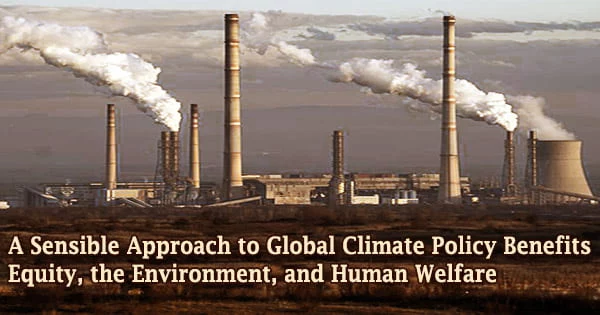According to a recent study led by Rutgers academics, a method to lowering greenhouse gas emissions guided by the ethical theory of utilitarianism would result in better outcomes for human development, equity, and the environment.
According to Mark Budolfson, a philosopher and assistant professor in the Department of Environmental and Occupational Health and Justice at the Rutgers School of Public Health, the study proposes a practical way of measuring how different nations should reduce carbon emissions in order to maximize global wellbeing.
“Utilitarianism tells us to care about everyone’s wellbeing, and to care just the same about each of us” says Dean Spears, an economist at the University of Texas at Austin, a corresponding author along with Budolfson, and an international team of researchers.
“When we do that, we learn that tackling climate change requires different ambitions of different countries because countries around the world start from different places with different resources.”
While countries pledged to reduce carbon emissions in the 2015 Paris Agreement, governments have yet to agree on their individual responsibilities, in part due to a lack of an agreed-upon method for calculating what emissions reductions should be expected from countries with vastly different resources.
The paper offers a straightforward, attractive, and transparent technique of assessing equity that may be used in a variety of climate policy evaluation models and conversations.
The key insight is that when emissions are allocated to where they do the greatest good, in poorer nations, global welfare increases and we do a better job of limiting emissions.
Navroz K. Dubash
“Simplicity can be an advantage in discussions and negotiations. And a minimal conception of equity that is as uncontroversial as possible may also be an advantage, given that more robust and complex conceptions of equity have led to deep disagreements,” says Budolfson, who is also a member of Center for Population-Level Bioethics and the Rutgers Institute for Health, Health Care Policy and Aging Research.
The researchers recommend that various nations be assigned different carbon emission reduction objectives depending on their income and ability to expand and preserve their citizens’ health and well-being.
“The key insight is that when emissions are allocated to where they do the greatest good, in poorer nations, global welfare increases and we do a better job of limiting emissions,” says Navroz K. Dubash, professor at the Centre for Policy Research in New Delhi.
The researchers utilize a computer model to determine how emissions reductions should be distributed throughout the world to optimize welfare, taking into account the interests of all world citizens equally. In this way, their technique has a basic utilitarian purpose and a straightforward utilitarian idea of equality at its heart, which drives its calculations, as well as estimates of benefits that focus on wellbeing rather than dollars of GDP.
The authors consider both the direct and indirect effects of climate change on people’s well-being, as well as the costs of lowering emissions. According to the authors, this clear utilitarian method catches much of what is relevant in terms of fairness, and it also provides for easy and transparent estimates of what should be done when equity is considered.
The utilitarian method, according to the researchers, corrects an essential structural bias in policy analysis by concentrating on wellbeing benefits rather than merely economic results.
“Previous analyses of climate policy sometimes get off on the wrong foot by relying on simple dollar-based goals like maximizing global GDP and thus ignore the importance of vast inequalities in income throughout the world,” adds Budolfson.
“Dollar-based calculations ignore the fact that a dollar sacrificed by a poor nation reduces wellbeing more than a dollar sacrificed by a wealthy one. Our method has estimates of the wellbeing impacts of a dollar of emissions reduction for a poor nation versus a dollar of emissions reduction cost for a rich nation. It’s critical to set up the study in this manner so that we can assess wellbeing impacts rather than just financial implications. We also set up the analysis so that the goal is to find the policy that best promotes wellbeing, rather than the one that maximizes the total dollar value of global wealth or GDP. We believe this is an improvement in policy analysis, and one that removes what is otherwise an all-too-common structural bias against the poor.”
According to the authors, utilitarianism is ethically modest since it just asks that each person’s interests be considered equally and that policies promote wellbeing.
“A utilitarian approach can be implemented in many of the ongoing climate change debates. It is easy to use in a wide variety of settings where transparency is important. And it has the advantage of prioritizing human wellbeing looking into our future, complementing analyses that call on historical responsibility for past emissions,” says Kevin Kuruc, an economist at the University of Oklahoma.
The utilitarian standard establishes a fair paradigm that reallocates emissions limitations while allowing impoverished regions to continue to thrive economically.
“This results in increased human development and standards of living for the global poor,” says Budolfson.
With Francis Dennig from Yale-NUS, Frank Errickson from Princeton University, and David Anthoff from the University of California at Berkeley, Budolfson, Spears, Dubash, and Kuruc performed the study.
On 13th September 2021, the publication Utilitarian criteria for emissions and commitments enhance justice, climate, and development was published online in Nature Climate Change.
















